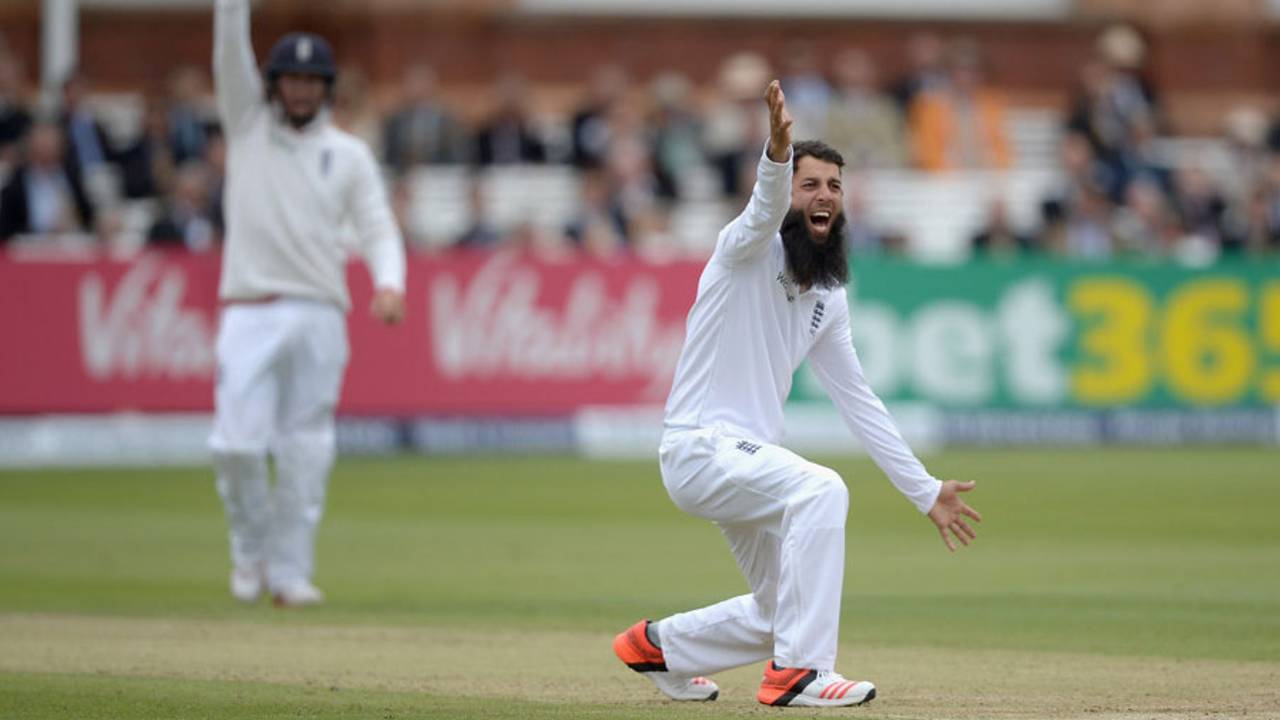Listeners to the BBC's
Test Match Special during the first Test against New Zealand at Lord's were exposed often, mostly by Geoff Boycott, to the received wisdom that
Moeen Ali is 'not a frontline spinner'. Proponents of this received wisdom rarely venture to define 'front line', although Boycott seems to place it at the level of Graeme Swann and Daniel Vettori, in which case there have been barely a dozen front line spinners in Test history. Ali may never be numbered among such a rarified cohort. Nevertheless, received wisdom sells him short.
Since the Second World War, thirteen bowlers purveying some species of spin have taken in excess of a hundred Test wickets for England: a list that excludes
Doug Wright, who played nine of his thirty four Tests before the war, but includes
Derek Underwood. They were all, by any reasonable reckoning, frontline spinners and after ten Tests, Ali's record withstands comparison with them all.
Graeme Swann took a pluperfect forty wickets in his first ten Tests. Close on his heels is the underrated Phil Tufnell (38), Underwood (37) and Jim Laker (36). Phil Edmonds managed 33, just one more than Ali, Monty Panesar and Ashley Giles, all of whom took 32 wickets in their first ten Tests. That puts Ali ahead of the likes of Ray Illingworth, Tony Lock and John Emburey. Heck, even Shane Warne only managed twenty five!
Unlike Panesar and Giles, Ali's wickets have cost him less than thirty a piece - 29.84, as compared to Panesar's 32.41 and Giles' 35.34. Granted, neither Giles nor Panesar rank among England's all-time greats, but both were largely reliable and respected performers, and thus far Ali has performed demonstrably better than both. Indeed, only Underwood and the Middlesex trio of Edmonds, Emburey and Tufnell paid less than Ali for their wickets in their first ten matches. At comparable points in their careers, Ali's wickets have been cheaper than those of Swann and Laker, England's finest wicket taking Test offspinners.
Despite this, received wisdom insists that Ali is not a frontline spinner, a disservice that has not merely led to him failing to receive acknowledgement from the media, but seems to have affected the confidence of Alastair Cook, his Test captain. Ali has bowled less than any other bowler on this list: fully 38.2 overs fewer than John Emburey, the next lowest, and a ludicrous 216 overs fewer than Giles racked up in his first ten Tests. Effectively, Giles had a whole other Test series worth of bowling in which to take the same number of wickets as Ali, at far higher cost.
Admittedly, Cook's lack of confidence may also be a consequence of Ali's perilously high economy rate: presently 3.53 runs an over. No other bowler on the list has economy rate higher than 3. Clearly, this element of his bowling is one which he and the England coaching staff will work closely in the lead up to the Ashes. Even here, however, there are mitigating factors. Attacking offspinners have always paid more dearly than some: the next two least economical bowlers on the list are Swann and Laker, whose overs cost 2.95 and 2.85 a piece respectively. Nor can any spinner in the modern game approach the parsimony permitted to early sixties spinners like David Allen, Fred Titmus or Illingworth. Illingworth's overs in his first ten Tests cost 1.73 runs a piece; in the first innings of his ninth Test, against South Africa at Edgbaston in 1960, he bowled 17 overs for only 15 runs, with 11 maidens. No one could be expected to emulate such figures in a world which contains Brendon McCullum.
The eagerness to overlook Ali's credentials as a frontline spinner is a consequence partially of the unfortunate proximity of his career to Swann's and partially, paradoxically, a result of his undoubted batting acumen. Swann was the best and the most successful offspinner England have ever had. He is no more a realistic benchmark for his immediate successor, similar to what Warne is for Nathan Lyon. Ali could become one of England's finest Test spinners without coming close to surpassing Swann's achievements or technical brilliance.
Ali's talents as a batsman, meanwhile, combined with the early doubts concerning the Test readiness of his bowling, have given the unjustified impression that he might be the latest iteration of that least loved of English cricketers, the bits-and-pieces player. Perversely, his demotion to No. 8 in the batting order, while underlining his importance to the side as a spinner, has heightened this impression: his name has been distressingly absent from recent discussions as to who might fill a top five batting spot if Ian Bell's decline proves terminal.
Moeen Ali deserves better. He deserves to be rescued from received wisdom, and celebrated for what he is and what he has the potential to become: a frontline spinner and a Test batsman who might be one of England's very best Test allrounders before all is said and done.
If you have a submission for Inbox, send it to us here, with "Inbox" in the subject line. Dr Arthur Newman lectures at the University of Ulster and plays for Coleraine Cricket Club's third eleven, for whom he is decidedly not a front line spinner. His fondness for Moeen Ali is only partially tinged by formative years spent watching Worcestershire at New Road.
